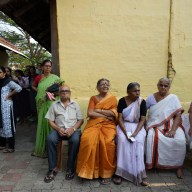Anthony Amodeo is HIV positive. He contracted the disease through intravenous drug use, lives on disability in downtown Vancouver and has to abide by a strict lifestyle to stay healthy.
He considers himself lucky.
Amodeo, 55, learned he was sick five years ago after checking into rehab for an addiction he said helped numb the pain of childhood sexual abuse.
“I am one of the more fortunate ones,” he said.
“Health-wise I’m okay. I just came back from Chilliwack where I had lunch with my daughter and son and new grandchild. It was the first time we’ve all got together in six years. I’ve reconnected with my family (and) they don’t have a problem with (my disease) at all.”
Amodeo said he knows many people with HIV whose relatives don’t want anything to do with them because they are afraid of the disease and disagree with the lifestyle that that got them sick.
“It’s harder to stay on track with your health when you don’t have that support,” he said.
Amodeo said it’s frustrating that people with cancer can count on a support network while those with HIV are often ostracized because of the assumption that they brought the disease on themselves.
“It doesn’t matter to me … what disease (you have) or if you’ve contracted it through your lifestyle or by mistake,” he said. “The fact of the matter is you should have support.”
Maxine Davis, executive director of the Dr. Peter AIDS Foundation, said it’s just this stigma that’s keeping high-risk populations from being engaged into treatment.
This demographic of people have trouble managing their own HIV care because of a lack of support, and because they may be struggling with homelessness, mental health issues and addiction, she said.
“One of the biggest determinants of anyone’s health is the presence of a personal support network,” Davis said.
That’s what the Dr. Peter Centre aims to offer by way of meals, access to health care, and compassionate, supportive staff.
Amodeo, who goes to the centre every day, said he’d “either be dead or a real mess” without it.
“It supports me totally. It’s my life,” he said.
“When you’re HIV positive and you miss three days of eating and sleeping, it sets you back health-wise three weeks. Those are the times when you’re going to catch a cold that’s going to give you pneumonia.”
According to Davis, around 17 per cent of the population in the Downtown Eastside is HIV positive, a similar percentage to developing countries.
New infection rates in the DTES, however, are less than one per cent.
“A huge part of the success undoubtedly is clean needle distribution and having a safe clean place for people to inject,” Davis said.
“In Vancouver there is a (growing) understanding of the degree to which one must go to engage (high risk) individuals in health care. You can’t just have a passive role. You have to find ways to bring people into care.”
S
he added that support from the federal government would make a huge difference.
“The public follows the cues that come (from our leaders),” she said.
“There’s far more leadership needed on the part of various levels of government to inspire people to be more compassionate and understanding. It’s their duty to all Canadians to stand up and inspire people to think differently. And if they did that we could be a very different country.”
















